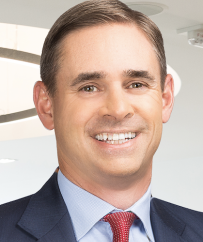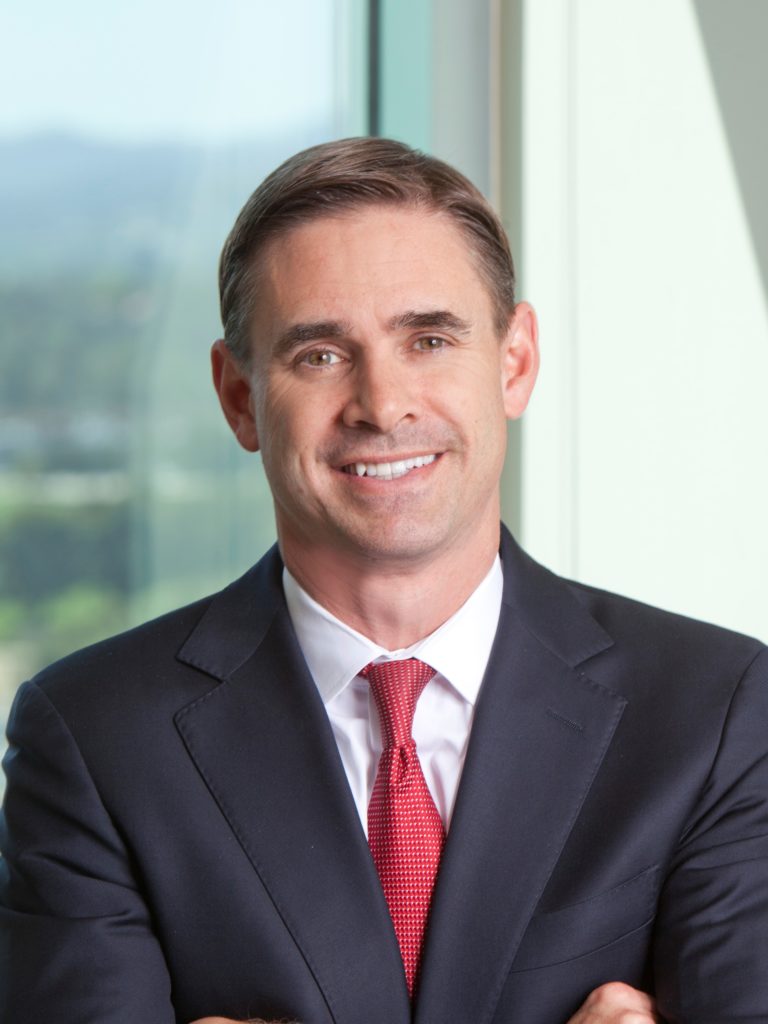Cityview was recently named by LA Business Journal as the decade’s most active multifamily developer in Los Angeles. In this TPR interview of Cityview CEO Sean Burton, shares how his development firm is boosting housing stock across the western United States despite the challenges—particularly after the passage of Measure ULA—in the City of Los Angeles.

“…The rule of thumb is that you generally want to replace about 3 percent of the existing housing stock every year to make up for obsolescence, new jobs, and demographic growth. In Los Angeles, we’re projected to deliver, over the next five years, between onehalf and 1 percent…I think ULA is a real challenge … It has significantly raised the costs of building any new housing in Los Angeles. That was an unintended consequence, but a pretty devastating one.”—Sean Burton

Sean, Let’s begin by reminding The Planning Report readers the breadth and focus of Cityview’s work in the Western United States.
Sean Burton: Cityview is a developer, operator, and investor in multifamily housing for the Western half of the country. We buy, rehab, and build. Building is probably how people know us the best, but we have done about 50% of each over our history.
We develop throughout California, both southern and northern. In the Pacific Northwest, we are active in Portland and Seattle, and then over to Denver and Boulder and Salt Lake City, and down through Arizona and Texas.
That’s what we’ve done for 20 years. We continue to be focused like a laser on those markets and that strategy because we think being a sharpshooter with deep market experience gives us a competitive advantage.
Focusing on housing markets that you’ve just enumerated, how is each different? Where are the most promising housing markets and where are the most challenging markets?
These markets generally all share something in common – a pretty significant supply and demand imbalance. If you look at demographic growth, job growth, and income growth, the markets I just named are growing significantly faster than the rest of the US.
Even more importantly, other than maybe for Dallas, these markets are not building enough housing. You have a real, supply-demand imbalance, which is, unfortunately, driving significantly higher housing prices and higher rents.
The rule of thumb is you generally want to replace about 3 percent of the existing housing stock every year to make up for obsolescence, new jobs, and demographic growth. In Los Angeles, we’re projected to deliver, over the next five years, between one-half and 1 percent.
We like to invest in markets where you have the supply and demand imbalance because it is a good investment for our investor partners and we feel we’re part of the housing crisis solution. We’re actually creating more housing options for people who live there.
Cityview was recently anointed by the LA Business Journal as the decade’s most active multifamily developer in Los Angeles. Elaborate on that accomplishment.
We’ve been at this a long time. We don’t dip our toe in a bunch of other asset classes. We were founded on the premise of adding more housing. We started here in LA; everything has grown out from here.
We’re currently not only very active owners– with 35+ existing buildings in Los Angeles–but we’re also continuing to develop. We’re delivering about 1500 units over the next few months of new housing and have another 1800 or so in process that we’re developing in the future. Not all of those are in LA, but we have a strong presence in LA County.

That’s how, for four or five years while the Business Journal has run this “largest developers in Los Angeles” list, we’ve been at the top of that list for multifamily.
Address more fully the multifamily market niche that Cityview prioritizes. What’s the firm’s price point and what attracts the firm to multi-family and this price point?
We’ve never been focused on fully government-subsidized affordable housing. We’re also not focused on high rise or ultra-luxury. We’ve always looked for that missing middle or attainable housing. Some would call it workforce housing, but we’re targeting units that are affordable to those who make 100 to 200 percent of the area median income, which is a big deal in a place like Los Angeles because AMI is quite low compared to other jurisdictions. For a household of two people 200 percent of AMI is around $130,000 a year.
We do it all with private capital, so we don’t need any government subsidy. We don’t take any of the allocation that’s going to go to true affordable housing or homeless housing. Those are important dollars that need to be spent on those things.
As a former LA City Planning Commissioner, the focus in California of late has been on providing affordable housing and housing for the homeless. That’s not necessarily the primary focus of your firm’s work, but share what Citiview can contribute to this public goal?
I think this is a common misconception when we talk to elected officials and policymakers that we try to make sure they understand. If you look at the recent regional housing (RHNA) numbers, we need 57,000 units per year in LA City for the next eight years. Anywhere from 50 to 75 percent of those are expected to be market rate, not government subsidized. Therefore, anywhere from 30,000 to 45,000 market rate units need to be built a year. If you look back in 2019 when money seemed to be growing on trees and interest rates were zero, we were building 15,000 to 20,000 units total a year, about a third what is needed.
Sometimes in the concern that elected officials have for creating more affordable housing, they want to crowd out market rate housing, which is still going to be the bulk of what we need. If you don’t have market-rate housing, you’re going to create more issues for folks on the lower end of the spectrum because there’s no place for people to move. We have to tackle the problem at multiple levels. No one disputes the need for affordable housing, but that doesn’t eliminate the need for market rate, especially workforce market rate.
I will also say, even though we build market-rate, virtually every single product we build has anywhere from 10 to 20% affordable units. Again, that’s without any subsidy. If you look at the affordable housing that we’ve actually contributed, it’s a lot more than most affordable housing developments.
What, in your opinion, contributes to our cities inadequately building enough housing, both market rate and affordable in this region? Is it the lengthy permitting process?
The lengthy permitting process is definitely a piece of it. But it’s a whole combination of things. It’s outdated zoning and land use policy. It is a very strong NIMBY sentiment. For any project the needs to be built in the city, it’s very hard to get the necessary support. Land is also very expensive, and costs have gone up. Construction costs are up almost 40 percent since the beginning of the pandemic. On top of that, it takes a long time to get permitting, which adds to the cost. LA is much slower than other jurisdictions. When you add all that together, it’s a recipe for less housing and higher housing costs.
I do think the new mayor is focused on this. She understands this is a real problem. She started with her first Executive Directive 1 to speed up permitting for truly affordable housing, but again, that’s a fraction of what’s actually built in the city. One of the suggestions we’ve made to her team and to planning is to expand that to mixed-income housing. I think that would really help expedite things.
Sean, you mentioned land cost as a contributing factor to the escalating price of housing. One could argue, as Henry George did long ago, that when you up-zone a property, you increase the the value of the seller’s land because of what can be prospectively built on the land. Is that not a serious problem for affordability?
At the end of the day, the market sets the price based on what’s available. I think it could be a problem, but again, construction costs are 40 percent higher. A lot of that’s going to come out of the land price. That’s just how the economics work. At the end of the day, one of the biggest things we can do for housing affordability is build more housing.
There’s a lot of talk of businesses that have left Los Angeles. You will often hear the business community broadly talk about regulations and taxes and those kinds of things, but if you actually talk to the firms who left, they will tell you the number one issue is the people that work there can’t afford housing. This is not just a housing issue. I think it’s a much broader economic issue for the city and the region.
You’re in multiple regions where the same issues are present. So what’s the common denominator?
I think the common denominator is that municipalities with significant development hurdles, timing, cost, support, etc., will ultimately produce less housing and potentially exacerbate housing affordability further. In most cases the is the opposite of what these regions want to be doing and Los Angeles is a perfect example, it’s very challenging to get things entitled in Los Angeles.
Is LA more or less challenging than other jurisdictions?
It’s the same for San Francisco, but it’s more challenging in LA than any other community that we work in (we are not actively developing in San Francisco for a whole host of reasons). We’re in supply-constrained markets where none of them are easy, but a lot of them are easier than Los Angeles.
Measure ULA has passed and it promised voters billions in funding to produce affordable housing. It’s still in its infancy and challenged in court. How would you assess the contribution and implementation of that funding?
I think ULA is a real challenge to the City of Los Angeles. It was something that was sold as a mansion tax. As we all know, it’s much broader than that. It has significantly raised the costs of building any new housing in Los Angeles. That was an unintended consequence, but a pretty devastating one.
Almost every developer I know is not underwriting new deals in Los Angeles right now because the cost is so impactful of ULA. It’s really a double whammy in the sense you’re going to have a lot less housing built, which is going to drive prices up significantly.
In addition, because of that and the tax, people are choosing not to sell. So, you’re not going to generate those billions of dollars of revenue that’s desperately needed for affordable housing.
Obviously, we need to find as much money as we can to build affordable housing, but we need to do it in a way that doesn’t cripple the building of market rate housing, which is only going to exacerbate the problem.
What was missing in the campaign to pass Measure ULA that should have been more fully addressed?
It all happened very quickly. I think there was not a lot of information out there. Maybe shame on the business committee and the real estate community for not raising the impact that it would potentially have. It’s bad for the city overall. We’re going to have to find a way to either repeal it or amend it in order to move forward.
As someone who has capital from investors all over the world and major institutions, there’s a lot of concern about Los Angeles for a lot of reasons. ULA, in many ways, is the straw that broke the camel’s back. There’s almost been a red line on both the equity and the debt side in Los Angeles because of it.
I think that we need to work, starting with elected officials and policymakers, to educate people on the impact and the unintended consequences of ULA by sharing facts.
I don’t expect the LA Times to run articles on ULA to lay out the other side of this. They haven’t to date. I think it’s going to have to happen through publications like The Planning Report that thoughtful people in Los Angeles read and through direct communication with elected officials and policymakers, backed by data.
Pivoting to the City of LA’s community plans, we interviewed you in 2009 upon your appointment by Mayor Villaraigosa to the City Planning Commission. You commented on the ongoing task of updating the city’s community plans. Last week, the City Council approved DTLA 2040. Elaborate on its significance of its adoption.
Anything that creates more certainty and predictability for housing is going to lower the cost and increase the speed of the creation of housing. I think that’s a positive. I’m just sorry it took so long to get there.
It was disappointing to see some last-minute changes made to the DTLA plan that the city’s own planning department said will potentially cut out 60 percent of the new housing. I would hope the City Council understands the impact of those decisions and what that’s going to mean for housing costs.
I’m glad we’re at least making some progress, and I hope that the Building and Safety and DWP and the Bureau of Engineering and the other departments that are critical to the actual production of new housing are onboard and ready to help move these projects forward.
As a former planning commissioner and successful infill developer, how might “city planning” improve the building of denser, managed, livable growth?
Obviously, I have a lot of respect for our planning department and I think that they’re the experts on this. There’s education for policymakers and elected officials on the fundamentals that needs to happen.
Some of the transportation or development overlays and things like that that the last Planning Commission did were very helpful. The little bit of housing being built is because of those kinds of things. So, planning can play a critical role.
In implementation, everything’s got to go through hearing examiners and the City Planning Commission and others. Expediting those projects is absolutely critical, and I know planning wants to do it. They’re very focused on that issue, and I think they should continue to take a leadership role to drive an agenda forward to create more housing in the city.
A recent TPR interview of Sola Impact’s Martin Muoto, shares his affordable housing finance model which relies on only private money to deliver housing at $250,000 a door in South LA. What Cityview’s take on Martin’s approach?
I have a lot of respect for Martin and his firm. He’s playing a critical role in a segment of new housing in neighborhoods that haven’t seen enough new housing being built. I understand his position about not taking traditional affordable housing financing.
I wish him the best of luck as he works to scale.
Let’s pivot to your civic work on the LA Board of Airport Commissioners and the massive capital modernization projects which you had overseen. With the distance now of no longer being on that commission, how do you assess LAX’s progress?
I think it’s going really well. We had set a goal of having a people mover and the rental car facility done and operational before the start of the Olympics when the Olympics were scheduled to be in 2024. To Justin Erbacci’s, as a general manager, and the current board’s credit, they are on track to deliver that, which I think will be a game changer for passengers at LAX.
I can’t wait until it’s all done and I know the 70 million passengers a year also cannot wait till it’s all done. Then, they won’t have to sit in the gridlock on the central horseshoe. I think it’s going to be great for passengers, but also great for broader Los Angeles.
Lastly, turning to your personal investment in civic education and the LA Coalition, could you describe the opportunities, challenges, and the makeup of that coalition? Are you accomplishing LA Coalition’s ambitous mission?
The LA Coalition was formed in 2009 after the Blue Ribbon Commission Mayor Villaraigosa put together to help figure out how Los Angeles could emerge from the great financial crisis. The commission was a group of civic and business leaders that came up with a series of recommendations.
The coalition was created to help implement the recommendations so the commission’s work wasn’t just another report and continue to provide resources, guidance, and expertise on those recommendations.
Just recently, Kevin Demoff from the Rams and I were asked to co-chair that organization as it goes into its next phase. It’s really going to be committed to two things. One is a laser-like focus on how we address the housing challenge that we have in LA. That’s homeless housing, affordable housing, and market-rate housing. The second area is workforce development. How do we address the skills gap that exists here? What kind of policy should the city and the state be pushing forward in order to address that skills gap?
I’m excited because those are two things I’m very passionate about, and I look forward to being part of the conversation and helping to drive some solutions to the challenges we face.

























